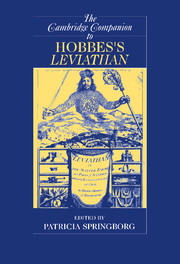Book contents
- Frontmatter
- General Introduction
- Part I: Of Man
- Part II: Of Commonwealth
- 6 Hobbes on Persons, Authors and Representatives
- 7 Hobbes on Glory and Civil Strife
- 8 Hobbes and the Philosophical Sources of Liberalism
- 9 Hobbes on the Right to Punish
- Part III: Of a Christian Commonwealth
- Part IV: Of the Kingdom of Darkness
- Part V: Hobbes’s Reception
- Bibliography
- Index
- Series List
7 - Hobbes on Glory and Civil Strife
from Part II: - Of Commonwealth
Published online by Cambridge University Press: 28 November 2007
- Frontmatter
- General Introduction
- Part I: Of Man
- Part II: Of Commonwealth
- 6 Hobbes on Persons, Authors and Representatives
- 7 Hobbes on Glory and Civil Strife
- 8 Hobbes and the Philosophical Sources of Liberalism
- 9 Hobbes on the Right to Punish
- Part III: Of a Christian Commonwealth
- Part IV: Of the Kingdom of Darkness
- Part V: Hobbes’s Reception
- Bibliography
- Index
- Series List
Summary
Hobbes's readers generally agree on the centrality of the concept of glory in his system as presented in The Elements of Law and De Cive; but no such consensus exists concerning the relevance of glory in Leviathan. The main aim of this chapter is to argue that the significance of glory in Leviathan cannot be overemphasised as it not only provides the foundation of Hobbes's political theory, but also furthers our understanding of Hobbes's philosophy of man. This chapter is organised in four sections. I argue in section I that, even though the definition of glory given in Leviathan may appear prima facie different from that provided in earlier works, the meaning of glory remains unchanged: glory is the joy of superiority and as such it implies comparisons between individuals. In section II a comparative analysis of the status of glory in The Elements of Law, De Cive, and Leviathan reveals that in the latter Hobbes replaces his former claim that glory is the ultimate motivation of all people with the milder claim that glory motivates some individuals. Section III presents the central claim of this essay that in Leviathan glory is the Archimedean point of Hobbes's theory of the state. The behaviour of glory-seekers is identified as the original source of conflict both in the state of nature and in the political state, as well as the reason why nothing less than the absolute, indivisible and irrevocable power of a Leviathan is required to guarantee internal peace. Section IV concludes by exploring some of the implications of the preceding argument and the function of education in the political state.
- Type
- Chapter
- Information
- The Cambridge Companion to Hobbes's Leviathan , pp. 181 - 198Publisher: Cambridge University PressPrint publication year: 2007
- 18
- Cited by

